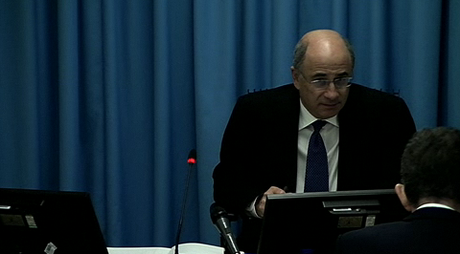
The Leveson Inquiry opens.
It was an explosive – and exhausting – first day at the Leveson Inquiry into media ethics in the wake of the phone hacking scandal that pulled down News International’s News of the World Sunday tabloid and sullied the reputation of British journalism.
Police have found new evidence that phone hacking was a “cottage industry” at News International, involving at least 28 employees and thriving up until 2009 – three years after two employees were jailed for their part in phone hacking – according to evidence presented by Robert Jay QC, counsel for the Inquiry.
Watch the hearings here.
Jay also told the panel, headed up by famously unflappable Lord Justice Leveson, that notebooks taken from Glenn Mulcaire, the private investigator who went to jail for the phone hacking work he carried out for the new-defunct News of the World, may have also been working for The Sun and non-News International title, The Daily Mirror. Further evidence uncovered by Scotland Yard in the bizarrely-named Operation Weeting indicates that illegal voicemail interception may have continued past Mulcaire’s time and past 2006, when News International executives claim hacking stopped.
“I suggest that it would not be unfair to comment that it was, at the very least, a thriving cottage-industry,” said Jay. “Apart from being illegal, and this is my language now, it was grubby, underhand, high-handed.”
But though many welcome the news that the British press is finally being held to account, some are worried that the Inquiry’s push for greater regulation could end of British media’s self-regulation, ultimately shackling a free press.
Leveson Inquiry not scared of Press. Jay, counsel for the Inquiry, warned that the Inquiry will not be cowed by the “extraordinary power” of the British press, The Telegraph flagged up. He painted an image of the British press as a vindictive institution that has frightened politicians away from press regulation with the “fear that by doing so the Press would withdraw support or subject them to close personal scrutiny.” The Leveson Inquiry, however, will have no such fear: “The inquiry will continue to discharge its public functions regardless of any crossfire,” Jay said. Leveson echoed his sentiments, adding that he will be examining the way the media treats witnesses, who will include actor Hugh Grant, author JK Rowling, and the Dowlers, for any sign of unfair personal scrutiny or negative coverage.
Don’t shackle the press. The Levelson Inquiry is quite rightly investigating those unscrupulous journalists who actions have besmirched the whole profession, editors at The Belfast Telegraph opined. But those unscrupulous types have opened the door to “all those critics who want some sort of statutory muzzle on newspapers”. Tread carefully, the paper warned: “Draconian legislation on the press would only open the door for more and more unregulated gossip sites on the internet beyond the control of anyone.”
Met to change relationship to press. The Metropolitan police force admitted on Monday that its relationship with the media could use a bit of work, The Guardian reported, acknowledging significant failures in the previous investigations into the phone hacking scandal. Neil Garnham QC, representing Scotland Yard, told the Inquiry, “We acknowledge that not all of the MPS’s relationships with the press in the past have met the test of being both ethical and transparent.” Now, he said, the Met is considering howto change that relationship, including possibly ensuring that senior officers are not able to work for news outlets after they retire from the force until a certain amount of time has passed.
Bad timing? Liz Hartley, The Daily Mail’s head lawyer, complained that the timing of the Leveson Inquiry is putting “the cart before the horse” by starting the civil investigation before the police investigation is concluded. According to The Guardian, she told a Society of Editors meeting on Monday that she couldn’t think of “any other inquiry trying to tackle a problem that you can’t define”, adding that it wouldn’t be possible to “get to the bottom of News International’s actions” until the criminal investigation into the hacking and possible pay outs to police officers finished.

